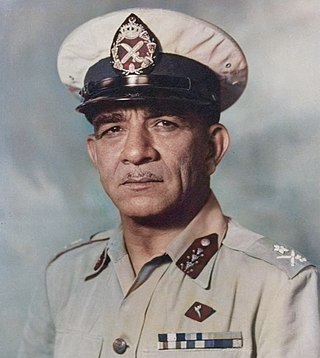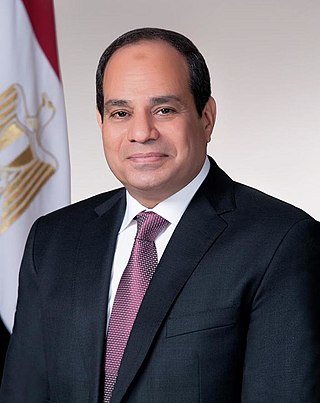| |||||
| Decades: | |||||
|---|---|---|---|---|---|
| See also: | Other events of 1951 List of years in Egypt | ||||
Events in the year 1951 in Egypt .
| |||||
| Decades: | |||||
|---|---|---|---|---|---|
| See also: | Other events of 1951 List of years in Egypt | ||||
Events in the year 1951 in Egypt .

Mohamed Mostafa ElBaradei is an Egyptian law scholar and diplomat who served as the vice president of Egypt on an interim basis from 14 July 2013 until his resignation on 14 August 2013.

Mohamed Bey Naguib Youssef Qutb El-Qashlan, also known as Mohamed Naguib, was an Egyptian revolutionary, and, along with Gamal Abdel Nasser, one of the two principal leaders of the Egyptian Revolution of 1952 that toppled the monarchy of Egypt and Sudan, leading to the establishment of the Republic of Egypt, and the independence of Sudan.

The Cabinet of Egypt is the chief executive body of the Arab Republic of Egypt. It consists of the Prime Minister and the cabinet ministers.

The General Intelligence Service, often referred to as the Mukhabarat is an Egyptian intelligence agency responsible for providing national security intelligence, both domestically and internationally. The GIS is part of the Egyptian intelligence community, together with the Office of Military Intelligence Services and Reconnaissance and National Security Agency. The Egyptian Intelligence service is considered to be the 5th most active intelligence service globally.
Mohamed Safwat El Sherif was an Egyptian politician who served as chairman of the State Information Service, minister of information, speaker of the Egyptian Shura Council, and secretary general of the ruling National Democratic Party, and head of the Supreme Press Council.

Presidential elections were held in Egypt in 2012, with the first round on 23 and 24 May 2012 and the second on 16 and 17 June. The 2012 Egyptian Presidential election was the first democratic presidential election of Egypt's history. The Muslim Brotherhood declared early 18 June 2012, that its candidate, Mohamed Morsi, won Egypt's presidential election, which would be the first victory of an Islamist as head of state in the Arab world. It was the second presidential election in Egypt's history with more than one candidate, following the 2005 election, and the first presidential election after the 2011 Egyptian revolution which ousted president Hosni Mubarak, during the Arab Spring. However, Morsi's presidency was brief and short-lived, and he later faced massive protests for and against his rule, only to be ousted in a military coup in July that year.
Events from the year 2011 in Egypt

The Ministry of Information was the ministry in charge of state-owned media and press in Egypt, and for regulating the practices through affiliate agencies between 1971 until its latest dissolution in 2021.

The Supreme Council of the Armed Forces is a statutory body of between 20 and 25 senior Egyptian military officers and is headed by Field Marshal Abdul Fatah al-Sisi and Lieutenant General Mohamed Ahmed Zaki. The council is convened only in cases of war or great internal emergencies. As a consequence of the Egyptian Revolution of 2011, SCAF assumed power to govern Egypt from departing President Hosni Mubarak on 11 February 2011, and relinquished power on 30 June 2012 upon the start of Mohamed Morsi's term as president. The Council has met regularly in times of national emergencies. During the course of the 2011 revolution, the Supreme Council of the Armed Forces met first on 9 February 2011 under the chairmanship of Egyptian president, Hosni Mubarak. The Council met for the first time without the chairmanship of the president on the following day, 10 February, and issued their first press statement which signaled that the council was about to assume power which they did the following day after Mubarak's resignation. The military junta was headed by Field Marshal Mohamed Hussein Tantawi who served as the Minister of Defense under Mubarak, and included the service heads and other senior commanders of the Egyptian Armed Forces, namely Lt. Gen. Sami Hafez Anan, Armed Forces Chief of Staff; Air Marshal Reda Mahmoud Hafez Mohamed, Air Force commander; Lt. Gen. Abd El Aziz Seif-Eldeen, Commander of Air Defense; and Vice Admiral Mohab Mamish, Navy Commander in Chief.

The Egyptian Social Democratic Party is a social liberal and a social democratic party in Egypt. It was founded after the 2011 Egyptian Revolution by the merger of two minor liberal parties, the Liberal Egyptian Party, and the Egyptian Democratic Party on 29 March 2011.

Mohamed Mohamed Morsi Eissa al-Ayyat was an Egyptian politician, engineer and professor who served as the fifth president of Egypt, from 30 June 2012 to 3 July 2013, when General Abdel Fattah el-Sisi removed him from office in a coup d'état after protests in June. An Islamist affiliated with the Muslim Brotherhood organisation, Morsi led the Freedom and Justice Party from 2011 to 2012.

The cabinet of Egyptian Prime Minister Hesham Qandil was sworn in on 2 August 2012. Qandil was appointed by President Mohamed Morsi, following the resignation of military-named premier Kamal Ganzouri. The cabinet consists of 36 ministers. The composition of the government is mostly formed by technocrats, with five Freedom and Justice Party (FJP) members and one member each from the Al-Wasat and Renaissance parties.

Abdel Fattah Saeed Hussein Khalil el-Sisi is an Egyptian politician and retired military officer who has served as the sixth and current president of Egypt since 2014. Before retiring as a general in the Egyptian military in 2014, Sisi served as Egypt’s deputy prime minister from 2013 to 2014, as its minister of defense from 2012 to 2013, and as its director of military intelligence from 2010 to 2012. He was promoted to the rank of Field Marshal in January 2014.
Ahmed Gamal El Din is a retired police general and Egypt's former minister of interior. He served in the Qandil cabinet.

Protests against the 2013 Egyptian coup d'état erupted in July 2013. Immediately following the removal of President Mohamed Morsi by the Egyptian Armed Forces on 3 July 2013 amid demonstrations against Morsi's rule, many protesters amassed near the Rabia Al-Adawiya Mosque to call for Morsi's return to power and condemn the military, while others demonstrated in support of the military and interim government. Deadly clashes such as Rabaa massacre continued for several days, with three particularly bloody incidents being described by officials as "massacres" perpetrated by security forces. During the month of Ramadan, prime minister Hazem al-Beblawy threatened to disperse the ongoing Pro-Morsi sit-ins in Rabaa al-Adaweya square and al-Nahda square. The government crackdown of these protests occurred in a violent dispersal on 14 August 2013. In mid-August, the violence directed by the army towards the protesters escalated, with hundreds killed, and the government declaring a month-long nighttime curfew.

Sherif Ismail was an Egyptian engineer and politician who served as the prime minister of Egypt from 2015 to 2018. He was also the minister of petroleum and mineral resources from 2013 to 2015.

Mohamed Ibrahim Moustafa, often referred to simply as Mohamed Ibrahim was the Minister of Interior of Egypt, from January 2013 until March 2015.
Events in the year 2018 in Egypt.
Events in the year 2019 in Egypt.